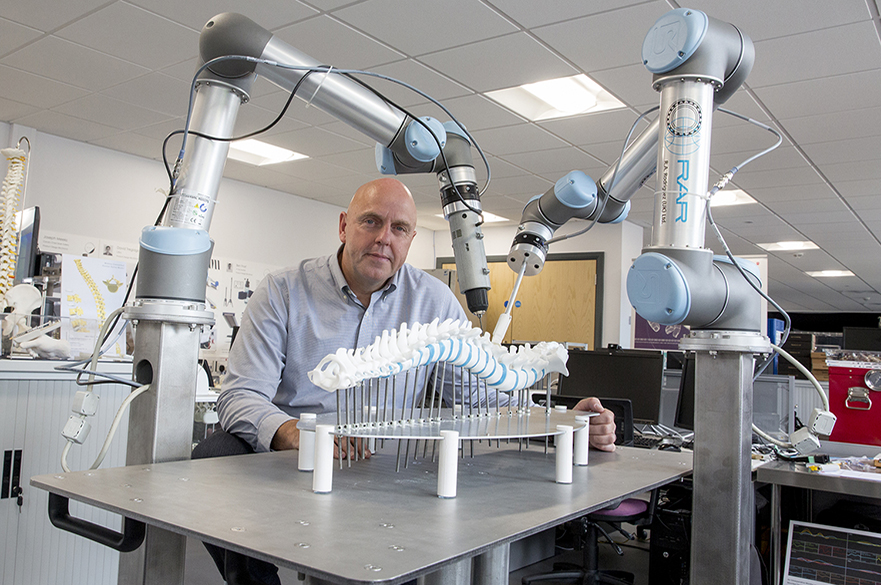Robots to perform spinal surgery with pinpoint accuracy
Robots will perform spinal surgery with greater accuracy than humanly possible as part of a ground-breaking research project led by Nottingham Trent University.
By Chris Birkle | Published on 9 January 2019
Categories: Press office; School of Architecture, Design and the Built Environment;

A team led by Professor Philip Breedon, of the Medical Design Research Group, has created a system which allows two robotic arms to semi-autonomously drill holes in individual vertebrae.
The drilling is required as part of an operation which allows surgeons to straighten the spines of patients who have conditions such as scoliosis or kyphosis.
The technology promises to deliver previously unachieved levels of accuracy, partly because the robotic arms move in unison and naturally with the patient’s spine during the operation whilst drilling.
The research also explores the use of augmented reality to provide surgeons with live visual feedback to illustrate the depth of each hole as it is drilled. Accuracy of drilling has been recorded at 0.1 of a millimetre.
“Surgeons performing life-changing operations to correct spinal conditions such as scoliosis or kyphosis have to ensure pinpoint levels of accuracy are achieved to avoid causing unnecessary and potentially serious injuries,” said Professor Breedon.
“This technology promises to deliver greater levels of accuracy than ever previously achieved – or even humanly possible – to improve the safety and efficiency of such procedures which are needed by people with serious spinal conditions.”
The holes drilled in the vertebrae are used to insert pedicle screws which are attached to deformity rod reducers that allow surgeons to lever individual vertebrae and realign the spine.
Two robotic arms work in collaboration during the procedure, known as the datum and tooling robots. The datum robot is secured to a vertebrae and moves with it to follow the natural movements of the patient. It relays data on this movement instantaneously to a computer.
The tooling robot then adjusts automatically so that it remains on its pre-defined path and continues to drill accurately.
It has been undertaken in collaboration with Professor David Brown of Nottingham Trent University’s School of Science and Technology and consultant spinal surgeon Professor Bronek Boszczyk, Head of Spinal Surgery at Benedictus Krankenhaus Tutzing, Germany, and a visiting professor at Nottingham Trent University.
Professor Boszczyk said: “It is paramount that spinal procedures are carried out with total accuracy in order to minimise what can be substantial risks to a patient.
“This technology has the potential to minimise those risks by performing a key part of the operation with accuracy which cannot be achieved by a human hand.
“It's a brilliant example of how robotics can enhance and improve the way in which intrusive operations are carried out, improving patient safety and ensuring efficiency of process.”
Notes for Editors
Press enquiries please contact Chris Birkle, Public Relations Manager, on telephone +44 (0)115 848 2310, or via email; or Helen Breese, Public Relations Manager, on telephone +44 (0)115 848 8751, or via email.
Nottingham Trent University (NTU) is one of the largest UK universities with nearly 28,000 students and more than 3,500 staff across four campuses, contributing £496m to the UK economy every year. It is one of the most environmentally-friendly universities, containing some of the country’s most inspiring and efficient award-winning buildings.
The University is passionate about creating opportunities and its extensive outreach programme is designed to enable NTU to be a vehicle for social mobility. The University is the sixth biggest recruiter of students from disadvantaged backgrounds in the country and 95.6% of its graduates go on to employment or further education within six months of leaving.
NTU is home to world-class research, winning The Queen’s Anniversary Prize in 2015 - the highest national honour for a UK university. The prize recognised pioneering projects to improve the detection of weapons and explosives in luggage, enable safer production of powdered infant formula and combat food fraud.
With an international student population of approximately 2,600 from around 100 countries, the University prides itself on its global outlook and seeks to attract talented students and staff from across the world